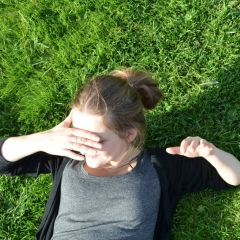Роман Гете "Страдания юного Вертера", где главный герой кончает жизнь самоубийством, вызвал массу подражающих самоубийств в Европе того времени, так что роман был даже запрещен в некоторых странах - настолько силен был его
эффект на чувствительные души 18-ого века. Вопрос на засыпку самому себе: Виноват ли автор или не виноват, вернее ответственен ли он за тот сильный эффект, что произвел или нет. И - имеет ли этот вопрос вообще ответ? С одной стороны ответственен, так как ОН писал этот роман, с другой - не совсем ответственен, ибо многие гэнии, так сказать, говорили, что не сами являлись авторами своих вэликих произведений, а якобы им кто-то нашептывал в минуты озарения что писать. И даже если он был ответственен, мог ли он предположить о том какой эффект произведет? Быть может сам не ведая всей силы своего таланта, коий есть, как говорится у людей, Божий дар, виноват ли он за смерти людей, на которые повлиял своим романом? Знаем ли мы всегда с большой уверенностью, как слово наше отзовется? Тем более что писал он не для того чтобы вызвать уныние, а просто описывал то что было с ним на самом деле в жизни, когда он был на пороге от сведения с собой счетов, а значит произведение предельно искренне, что является одним из главных качеств настоящего искусства. Насколько все закономерно, а насколько случайно? Чем дальше разварачивается мой ответ, тем больше у меня возникает вопросов. Короче говоря, я пас.
эффект на чувствительные души 18-ого века. Вопрос на засыпку самому себе: Виноват ли автор или не виноват, вернее ответственен ли он за тот сильный эффект, что произвел или нет. И - имеет ли этот вопрос вообще ответ? С одной стороны ответственен, так как ОН писал этот роман, с другой - не совсем ответственен, ибо многие гэнии, так сказать, говорили, что не сами являлись авторами своих вэликих произведений, а якобы им кто-то нашептывал в минуты озарения что писать. И даже если он был ответственен, мог ли он предположить о том какой эффект произведет? Быть может сам не ведая всей силы своего таланта, коий есть, как говорится у людей, Божий дар, виноват ли он за смерти людей, на которые повлиял своим романом? Знаем ли мы всегда с большой уверенностью, как слово наше отзовется? Тем более что писал он не для того чтобы вызвать уныние, а просто описывал то что было с ним на самом деле в жизни, когда он был на пороге от сведения с собой счетов, а значит произведение предельно искренне, что является одним из главных качеств настоящего искусства. Насколько все закономерно, а насколько случайно? Чем дальше разварачивается мой ответ, тем больше у меня возникает вопросов. Короче говоря, я пас.
Goethe's novel "The Suffering of Young Werther", where the protagonist commits suicide, caused a lot of imitative suicides in Europe at that time, so the novel was even banned in some countries - it was so powerful
effect on sensitive souls of the 18th century. The question is about filling yourself up: Is the author guilty or not guilty, or rather is he responsible for the strong effect that he produced or not. And - does this question have an answer at all? On the one hand, he is responsible, since HE wrote this novel, on the other, he is not entirely responsible, for many geniuses, so to speak, said that they themselves were not the authors of their great works, but someone allegedly whispered to them what to write in the moments of insight. And even if he was responsible, could he guess what effect would produce? Perhaps he himself, not knowing the full power of his talent, which, as people say, has God's gift, is he to blame for the deaths of people who were influenced by his novel? Do we always know with great confidence how our word will respond? Moreover, he did not write in order to cause discouragement, but simply described what happened to him in reality in life, when he was on the verge of settling accounts with himself, which means the work is extremely sincere, which is one of the main qualities of the present art. How much is everything natural, but how random? The further my answer develops, the more questions I have. In short, I pass.
effect on sensitive souls of the 18th century. The question is about filling yourself up: Is the author guilty or not guilty, or rather is he responsible for the strong effect that he produced or not. And - does this question have an answer at all? On the one hand, he is responsible, since HE wrote this novel, on the other, he is not entirely responsible, for many geniuses, so to speak, said that they themselves were not the authors of their great works, but someone allegedly whispered to them what to write in the moments of insight. And even if he was responsible, could he guess what effect would produce? Perhaps he himself, not knowing the full power of his talent, which, as people say, has God's gift, is he to blame for the deaths of people who were influenced by his novel? Do we always know with great confidence how our word will respond? Moreover, he did not write in order to cause discouragement, but simply described what happened to him in reality in life, when he was on the verge of settling accounts with himself, which means the work is extremely sincere, which is one of the main qualities of the present art. How much is everything natural, but how random? The further my answer develops, the more questions I have. In short, I pass.
У записи 2 лайков,
0 репостов.
0 репостов.
Эту запись оставил(а) на своей стене Эльдар Расулов-Елисеев






















